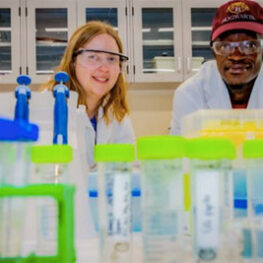What does a traditional West African dish have to do with road salt spread across snowy Canadian
streets every winter?
The two subjects are equal passions for chemistry PhD candidate Robert Addai, who works in Western’s Material Science Addition lab and studies how metals corrode when they come into contact with food and road salts.
It all started with fufu, a common staple in his diet growing up in Ghana. A starchy food that’s common in West African cuisine, traditionally fufu is made by pounding cassava, a tropical root vegetable. That
labour-intensive process can take hours.
The preparation of fufu has evolved, the same way butter and other food staples have become almost exclusively machine produced. Most people now use a metal “fufu pounding machine” that offers the
repetitive pounding action in a hands-free form, Addai explained.
“It is a delicious food, but it takes a lot of time. The machines also works in the form of friction, by
pounding. My research is focused on whether metals are released from the machine into the fufu,” Addai
said.
“Our question is, where is the wear and tear in the machine, and is it impacting the fufu? When people eat this, what is the effect? We have to find a way of seeing how much metal is in the food.” – Robert Addai, PhD candidate in chemistry
Addai measures the chromium, iron, manganese and nickel present in samples of fufu, by testing a slurry
of the food in contact with samples of two types of carefully cleaned stainless steel. After breaking it
down in a digester, he analyzes the solution for trace amounts of metals using a specialized tool to
quantify metal ions. After reviewing initial results, he found the highest concentrations of iron followed
by manganese, chromium and nickel.
Addai tests fufu made from powder, cassava flour, which is the most common preparation for those
making the food in Canada, as well as some homemade samples of traditional fufu made by machine.
His samples are tested after 30 minutes, 24 hours and one week, since fufu can be cooked for various
lengths of time. The release of metals increases with time, Addai has found. In some samples, there are
potentially harmful levels of nickel and chromium, which have been linked to possible health effects such
as respiratory and cardiovascular issues, as well as some types of cancer.
Health concerns originally sparked Addai’s interest. He wanted to know if the metals in contact with food enjoyed by his friends and family were playing a role in rates of illness.
“There are a lot of people, not only in Ghana, but all over the world, especially in the diaspora who are
suffering from cancer, heart disease and other illness. Scientifically, we don’t always know the cause. So I
wanted to study this (food preparation) from the start to check if some of the diseases are coming from
this food,” he said.
There are other concerns, too, such as the type of metal used to create the fufu machines.
“They use recycled materials, that can contain a lot of lead,” said chemistry professor Yolanda Hedberg,
Addai’s supervisor. She conducts similar research testing for the prevalence of metals in dairy products.
Addai’s deep dive into fufu led him to similar research on metal corrosion in an environment far from a
Ghanaian kitchen: an icy Canadian road.
Hedberg needed a researcher to work on a new project in the Material Science Addition lab. Addai had
the knowledge and the willingness to jump in, Hedberg said.
In addition to investigating metals in contact with fufu, Addai is now looking at different brands of road
salt used for melting and grip on the roadways in Canada’s coldest months. Despite straddling two
seemingly disparate fields – from fufu to road salts – Addai conducts the same kind of core research in
both projects.
Various brands and formulations of road salt were tested on stainless steel squares to measure the
corrosion. (Christopher Kindratsky/Western Communications)
Last winter, Addai began running tests on the same squares of stainless steel he used for his cassava
research. This time, they were laid out in a parking lot of Western Research Parks for a small pilot project.
The metal was left outside for two months and monitored as it was sprayed weekly with nine different
varieties of road salt.
Addai will continue that work next winter, along with other researchers, to look at the environmental
effects of popular types of road salt, including the type used by Western’s facilities management team.
“We hope to recommend the best product, to balance effectiveness with environmental impact,” he said.
Addai said it can sometimes be tedious to wait for the results of his studies, many of which undergo
multiple stages and phases. It takes time to reach the stage of final analysis.
But challenges in examining the tiniest particles of fufu haven’t dimmed his enthusiasm for the subject –
or the food.
Addai is travelling home to Ghana soon and said he can’t wait to enjoy the fufu made by his loved ones,
instead of the version he makes in Canada using cassava flour.
“I told my family, have the fufu ready,” Addai said with a laugh.
“It’s the first thing I want to do. I miss it so much.”
